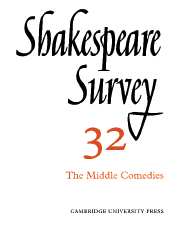Book contents
- Frontmatter
- Shakespeare’s Middle Comedies: A Generation of Criticism
- ‘Perfect Types of Womanhood’: Rosalind, Beatrice and Viola in Victorian Criticism and Performance
- The Stage Representation of the ‘Kill Claudio’ Sequence in Much Ado About Nothing
- As You Like It Adapted: Charles Johnson’s Love in a Forest
- Social Relations and the Social Order in Much Ado About Nothing
- Sexual Disguise in As You Like It and Twelfth Night
- Twelfth Night and the Myth of Echo and Narcissus
- ‘Smiling at grief’: Some Techniques of Comedy in Twelfth Night and Così Fan Tutte
- ‘My Lady’s a Catayan, we are politicians, Maluolios a Peg-a-ramsie’ (Twelfth Night II, iii, 77-8)
- The Importance of Being Marcade
- A Hebrew Source for The Merchant of Venice
- The Marriage Contracts in Measure for Measure: A Reconsideration
- Richard III: Antecedents of Clarence’s Dream
- Deep Plots and Indiscretions in ‘The Murder of Gonzago’
- ‘What is’t to leave betimes?’ Proverbs and Logic in Hamlet
- The Tempest: Language and Society
- Pictorial Evidence for a Possible Replica of the London Fortune Theatre in Gdansk
- A Year of Comedies: Stratford 1978
- The Year's Contributions to Shakespearian Study: 1 Critical Studies
- 2 Shakespeare’s Life, Times and Stage
- 3 Textual Studies
- Index
- Plate section
Richard III: Antecedents of Clarence’s Dream
Published online by Cambridge University Press: 28 March 2007
- Frontmatter
- Shakespeare’s Middle Comedies: A Generation of Criticism
- ‘Perfect Types of Womanhood’: Rosalind, Beatrice and Viola in Victorian Criticism and Performance
- The Stage Representation of the ‘Kill Claudio’ Sequence in Much Ado About Nothing
- As You Like It Adapted: Charles Johnson’s Love in a Forest
- Social Relations and the Social Order in Much Ado About Nothing
- Sexual Disguise in As You Like It and Twelfth Night
- Twelfth Night and the Myth of Echo and Narcissus
- ‘Smiling at grief’: Some Techniques of Comedy in Twelfth Night and Così Fan Tutte
- ‘My Lady’s a Catayan, we are politicians, Maluolios a Peg-a-ramsie’ (Twelfth Night II, iii, 77-8)
- The Importance of Being Marcade
- A Hebrew Source for The Merchant of Venice
- The Marriage Contracts in Measure for Measure: A Reconsideration
- Richard III: Antecedents of Clarence’s Dream
- Deep Plots and Indiscretions in ‘The Murder of Gonzago’
- ‘What is’t to leave betimes?’ Proverbs and Logic in Hamlet
- The Tempest: Language and Society
- Pictorial Evidence for a Possible Replica of the London Fortune Theatre in Gdansk
- A Year of Comedies: Stratford 1978
- The Year's Contributions to Shakespearian Study: 1 Critical Studies
- 2 Shakespeare’s Life, Times and Stage
- 3 Textual Studies
- Index
- Plate section
Summary
Clarence’s dream, like Richard’s courtship of Anne, is one of the embellishments Shakespeare introduced in giving body and shape to his dramatisation of chronicle material in Richard III. For this dream he had not, as he had for the fact though not the substance of Richard’s fearful dream on the eve of Bosworth, any warrant in his historical sources. It consists of a number of distinguishable elements. First, Richard is Clarence’s dream partner in his delivery from the Tower: this repeats the irony of Richard’s promise to effect it (I, i, 114f), and the kind of delivery he has just despatched the murderers to effect (I, iii, 356). Further, the dream represents Richard (though innocently, in accord with Clarence’s belief in his friend-ship) as responsible for Clarence’s death by drowning-the fate he will suffer before the end of the present scene. Clarence tells how Gloucester (Richard) tempted him ‘to walk/Upon the hatches’ where ‘as we pac’d along’
Upon the giddy footing of the hatches,
Methought that Gloucester . . .
Struck me . . . overboard.
(i, iv, 12f, 16–18)- Type
- Chapter
- Information
- Shakespeare Survey , pp. 145 - 150Publisher: Cambridge University PressPrint publication year: 1980
- 1
- Cited by

